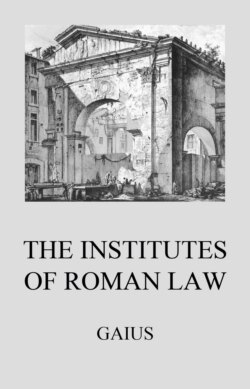Читать книгу Institutes of Roman Law - Gaius - Страница 27
На сайте Литреса книга снята с продажи.
ОглавлениеDE LEGITIMA AGNATORVM TVTELA.
§ 155. In default of a testamentary guardian the statute of the Twelve Tables assigns the guardianship to the nearest agnates, who are hence called statutory guardians.
§ 156. Agnates (3, § 10) are persons related through males, that is, through their male ascendents: as a brother by the same father, such brother’s son or son’s son; a father’s brother, his son or son’s son. Persons related through female ascendents are not agnates but simply cognates. Thus, between an uncle and his sister’s son there is not agnation, but cognation: so the son of my aunt, whether she is my father’s sister, or my mother’s sister, is not my agnate, but my cognate, and vice versa; for children are members of their father’s family, not of their mother’s.
§ 157. In former times, the statute of the Twelve Tables made females as well as males wards of their agnates: subsequently a law of the Emperor Claudius abolished this wardship in the case of females: accordingly, a male below the age of puberty has his brother above the age of puberty or his paternal uncle for guardian, but a female cannot have such a guardian.
§ 158. Capitis deminutio extinguishes rights by agnation, while it leaves unaffected rights by cognation, because civil changes can take away rights belonging to civil law (jus civile), but not rights belonging to natural law (jus naturale).
§ 156. As to this definition of agnati see Moyle’s note to Inst. 1, 15, 1. The maxim here enunciated is calculated to give a false idea of the relation of the institutes of jus gentium to those of jus civile. Title by cognation is just as much an institute of positive law as title by agnation, though cognation, or blood-relationship, is in itself a natural and permanent tie, while agnation is an artificial one, and therefore only occasional. The synthesis of title and right in jus civile may be freakish and capricious, while that in jus gentium may be reasonable and expedient; but both are equally positive institutions, and both are equally mutable and liable to be overruled. Accordingly, the specious-sounding maxim, that revolutions in status or civil condition cannot affect such rights as are annexed to natural titles, crumbles away as soon as we examine it, for we find that it only holds good of the most insignificant change, the minima capitis minutio, 3 § 27, and that maxima and media capitis minutio extinguish title by cognation, which belongs to jus gentium, as well as title by agnation, which belongs to jus civile. Inst. 1, 16, 6.
The truth is, that the effects of a collision of Civil and Natural law fall under two very different classes, which it is important to distinguish.
1. If the command of the civil lawgiver, under the sway of motives financial, political, ethical, or religious, is highly imperious and absolutely compulsive, all natural titles with which it may come in conflict are absolutely void and inoperative: e. g. the Sc. Velleianum, prohibiting suretyship of women, allowed no naturalis obligatio to be produced by any such suretyship: and so with the laws prohibiting gambling and usury.
2. If the command of the civil law is less peremptory and absolute, it may deprive any conflicting natural title of plenary force, and yet leave to it a naturalis obligatio capable of acquiring efficacy by some machinery of positive law; e. g. the Sc. Macedonianum, prohibiting money loans to a filiusfamilias without the sanction of his father, made them irrecoverable by action, and yet the courts recognized in the borrowing filiusfamilias a naturalis obligatio, which was capable of novation, Dig. 46, 2, 19, and a bar to recovery back (condictio indebiti) in case of actual repayment, Dig. 14, 6, 10.
When Justinian consolidated the law of intestate succession and made the right of succession depend on cognation instead of agnation, he made a corresponding change in the obligation of guardianship, which henceforth devolved on cognates instead of agnates, women as formerly, with the exception of mothers and grandmothers, being excluded from the office, Nov. 118, 5.
